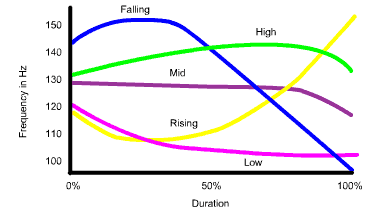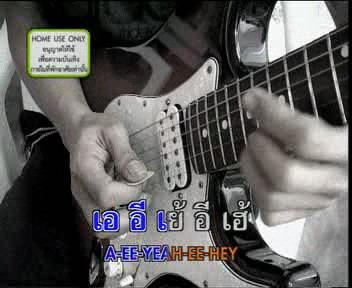Culture
Traveling
Language
MEDIA
Thai Videos
Thai Cooking
Thai Books
Thai Radio
Thai TV
MISC
Extras
About Thailand
About Me
Contact Me
SPONSORS
Find Hotel
in Thailand



Teach a Thai to Teach you Thai In my experience learning Thai I have found that Thai people are really bad at teaching their own language. It isn't actually their fault, its just the psychology of how a native speaker understands their own language. Native speakers of a language have internalized the rules of their own language way below a subconscious level. Their mind automatically can apply the rules of grammar and vocabulary without actually consciously thinking about it. Ask a native speaker why must something be said in a certain way and you will get, 'I don't know, its just the way your supposed to say it.' So how does a native Thai speaker understand language?
The Tones
Thai - mái mài mâi mai?
Chinese - mama mà ma de má ma
 This is because the Thai brain actively 'hears' words of different tones as completely different words. Say 'mai' in two different tones, and they will hear two very different words. Contrarily, a native English speaker would hear the same exact word spoken in different pitches. Biologically, fMRI (functional magnetic resonance imaging) has shown that tonal speakers have a section of the brain dedicated to interpreting tones of a word that non-tonal speakers do not have. This brain area has been found in Chinese, Thai's, and other tonal speakers. Although no research I am aware of has scanned brains of learners of a tonal language, I would guess that they are developing this tonal neural structure gradually as they learn the new language.
 Ever asked a Thai which tone a word was and they didn't know? Or they would suddenly starting counting on their fingers while mumbling to themselves? While a westerner would refer to the tones as high, middle, low, rising, and falling, a Thai would refer to the tones as 1, 2, 3, 4, and 5.
2 low 3 falling 4 high 5 rising Early in the education of a Thai child, they are taught to repeat various words (usually 'gah') in each of the five tones, and in the order of 1 to 5. If you ask a Thai if a word is a falling tone, they wouldn't know. But if you ask them is it tone 3, they could tell you after they count on their fingers. The point I am trying to make is, learn which number represents which tone. This way a Thai can answer your 'which tone is it' question. Or another option would be to teach them why we think of tone 2 as being low, or tone 5 as rising . . . Something interesting to comment on, although it doesn't relate to the Thai language specifically, is how Mandarin Chinese comprehend tones. The odd thing is, they are consciously aware of them. They have numbers for each tone just like Thai does, although in a different order. And if you ask them what tone, chances are they will do some strange karate chop in front of you. A different angle of the chop represents a different tone. Interestingly, the angle is the same as tone - a high chop for a high tone, or a top down chop for a falling tone, for example. This means they understand the tones more like a non-tonal speaker . . . I have no idea why, just interesting to know =)
 So now you may be asking, 'if a non-tonal speaker has trouble with a language with tones, wouldn't a tonal speaker understand a language without tones?' Yes they would have difficulty, but not nearly as much. In spoken English, we do use tones, but not for lexical meaning (vocabulary). Instead, tones are used to express emotion, place emphasis on certain words, or show contrast. In the Thai language, different word choices reflect emotion, etc. But in English, they are forced to understand how to use tones to express those emotions. I have had Thais tell me that after 5+ years of living in the US they still feel like using tones to express emotion in English is entirely guesswork . . .
Karaoke (kaa - raa - oh - kay)
 At first reading karaoke can be challenging for both native speakers and learners of Thai. But with a little practice, you can figure out the words and tones through context. There are two tricks you should remember. First, try to spell out all words as phonetically correct as possible. Second, when reading karaoke, IGNORE THE SPELLING. Just pronounce the words out phonetically to yourself, and try to be as immune to spelling as possible. For example, don't let 'my,' 'maai,' and 'mai' spelling differences throw you off. The same for 'dtok' and 'tok,' or 'paa,' 'bpaa' and 'ba.'
Speak Slowly, Please
That concludes what I know at the moment. |